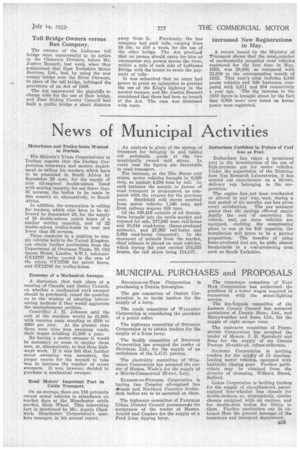News of Municipal Activities
Page 37

If you've noticed an error in this article please click here to report it so we can fix it.
Motorbuses and Trolley-buses Wanted in Durban. '
His Majesty's Trade Commissioner at Durban reports that the Durban Corporation tramways and motors department is calling for tenders, which have to be presented in South Africa by September 29 next, for the supply of nine oil-engined double-saloon buses with seating capacity for not fewer than 52 persons, the bodies to be made in this country or, alternatively, in South Africa.
In addition, the corporation is calling for tenders, which also have to be delivered by September 29, for the supply of 16 double-saloon petrol buses of a similar seating capacity, and of 22 double-saloon trolley-buses to seat not fewer than 55 persons.
Those concerns in a position to supply vehicles built in the United Kingdom can obtain further particulars from the Department of Overseas Trade, 35, Old Queen Street, London, S.W.1, reference GX12767 being quoted in the case of the oilers, GY12769 for petrol buses, and GY12768 for trolley-buses.
Economy of a Mechanical Sweeper.
A discussion that took place at a meeting of Cheadle and Gatley Council, on whether a mechanical road sweeper should be purchased, raised the question as to the wisdom of adopting laboursaving methods if they would aggravate the unemployment problem.
Councillor J. H. Johnson said the cost of the machine would be £1,000, with running costs standing at £500 to £600 per year. At the present time there were nine men sweeping roads, their wages totalling £1,300 a year.
By having a motor sweeper it would be necessary ,to cease to employ these men, or, alternatively, to find them highways work. If it was felt that further street ,sweeping was necessary, the proper course for the council to take was to increase the number of street sweepers. It was, however, decided to purchase a mechanical sweeper.
Road Motors' Important Part in Cattle Transport.
On an average, there are 119 privately owned motor vehicles in attendance on market days at the Manchester cattle market, Mode Wheel. This interesting fact is mentioned by Mr. Austin Chadwick, Manchester Corporation's markets manager, in his annual report. An analysis is given of the system of transport for bringing in and taking out perishable goods at the two municipally owned cold stores. In every case the figures are favourable to road transport.
For instance, at the Elm Street cold stores, motor vehicles brought in 6,560 tons, as against 4,294 tons by rail. In each instance the margin in favour of road transport is pronounced, as compared with the returns for the previous year. Smithfield cold stores received from motor vehicles 1,346 tons, and from railway wagons 588 tons.
Of the 388,416 animals of all descriptions brought into the cattle market and exposed for sale, 277,945 were rail-borne and 80,541 road-borne (home-produced animals), and 27,263 rail-borne and 2,664 road-borne (imported). In the transport of animals from the market, chief reliance is placed on road vehicles, which during the year carried 274.279 beasts, the rail share being 114,137.
Rotherham Confident in Future of Coal Gas as Fuel.
Rotherham has taken a prominent part in the investigation of the use of high-pressure gas for motor vehicles. Under the supervision of the Birmingham Gas Research Laboratories, it has carried out experiments on a 30-cwt. delivery van belonging to the corporation.
The engine ,has ,not been overhauled or altered' in any way, sand, during a test period of six months, gas has given every satisfaction. The gas manager states that the savings effected amply justify the cost of converting the vehicle, and, as more vehicles are equipped, enabling the compressing plant to run at its full capacity, the installation will prove to 'be a paying proposition. The benefits of using home-produced fuel are, he adds, almost Incalculable in a coal-producing area such as South Yorkshire.




























































































